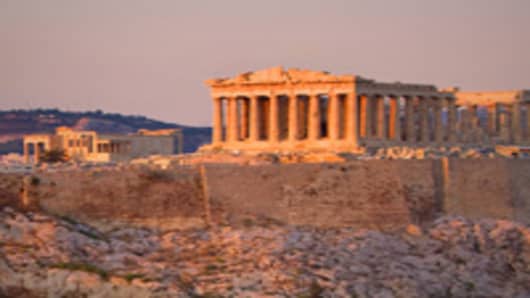As the summer holiday season gets under way in a Greece slumped in recession, striking truck drivers this week paralysed the country, cutting off fuel and food supplies. Air traffic controllers have been working to rule. Picketing seamen have scared off cruise liners. Public sector unions this month staged their sixth general strike of the year, enraged by serial tax increases, steep wage and pension cuts and looming job losses. Added to all that, the troika is in town.
The institutional trio made up of the International Monetary Fund, the European Commission and the European Central Bank is in Athens to measure progress on the severe austerity and reform package to which the socialist government of George Papandreou signed up as the condition for a €110 billion ($144 billion, £92 billion) loan from the IMF and the eurozone to prevent sovereign debt default. As the 30-strong team shuffles between hotels and government departments in their quarterly round of forensic monitoring, Greece, with its long and unhappy history of foreign intrusion from the Ottomans to the Nazis, could be confused with a country being run as a quasi-protectorate.
And yet there is a scent of confidence in the air. Greece, which has earned a reputation for public spending binges and cooking the books, rampant corruption and lethargic inefficiency, may just be starting to become a different place.
That matters not just for Greece. Contagion from the Greek public spending bubble added menace to the credit and property bubbles in Ireland and Spain, and spread across the weaker periphery of the eurozone to an extent that has called into question the very viability of the euro.
In Greece, wrenching fiscal consolidation is on track. Some major reforms, such as to the pensions system, have been voted through parliament. By today, a census to establish how many are on the state payroll will be completed. “The mystery will be solved, finally,” George Papaconstantinou, the finance minister, observes wryly. The government is taking early steps to open up an essentially closed economy, distorted by battalions of vested interests.
“In the last six months the Greeks grew up by one century,” says Elena Panaritis, an MP from the ruling Panhellenic Socialist Movement (Pasok) and former World Bank economist. “Before that they didn’t understand the word market.”
There is a growing perception that this crisis has created a once-in-a-generation opportunity to reform the economy, win the consent of society for far-reaching change, and cast off the most debilitating post-Ottoman features. “What is happening here is a revolution,” says Nikos Karamouzis, deputy chief executive of EFG Eurobank, a Greek banking group. “Things are happening now which should have happened 30 years ago.”
Yet behind the revival in confidence lurks fear things could still fall apart. “It’s a bit like bungee jumping,” says one official. “It’s very exhilarating but you’re in that moment when you don’t quite know whether you’ll hit the bottom or come up again.”
The government believes it can outperform the testing targets set out in the memorandum of understanding it signed with the IMF-EU and pushed through parliament in May, requiring it to cut the budget deficit from 13.6 percent of gross domestic product last year to 8.1 percent this year. In the first half, it reduced the budget deficit by 45 per cent (and the primary deficit, exclusive of interest payments, by 64 per cent) against a target for the year of 40 per cent. “We’ve done an analysis of worst-case scenarios on both spending and revenue, and we have enough margin to hit the 8.1 percent deficit figure at the end of the year,” says Mr Papaconstantinou.
This interim result has not come just from cutting wages and pensions. Layers of fat have been trimmed from other current spending. Yet revenue-raising targets have not been met despite sharp boosts in fuel and excise levies, and value added tax. And part of the spending reduction comes from delaying payments to suppliers and capital investment. The finance ministry expects the recession to be shallower than originally forecast. But coming after 10 quarters of shrinking private investment, and sharp wage cuts in a closed economy in which foreign investment is hampered by corruption and bureaucracy, this could block the path to desperately needed growth.
The score card on structural reform is good so far. The number of municipalities has been cut; the public sector payroll has been centralized. A financial stability fund for the banks is nearly in place. But the flagship reform is pensions – on which even the military junta that ruled from 1967 to 1974 backed down.
The era of retiring at 50 on full pension is over; people will need to work until 65, with 40 years’ full contributions, and the rate at which pensions accrue has been halved. The law has yet to be fully evaluated by actuaries but the government is conscious it wasted its first four months in office dithering. “I wish we’d had six months more to prepare the pensions reform,” says Mr Papaconstantinou, “but in six months’ time I don’t know whether we would get it through.”
Notwithstanding the sound and fury of the wave of strikes and demonstrations, the public mood is sullen rather than incendiary. “What is striking at the moment is the lack of real resistance to what we are doing, which is very harsh. This is because people do appreciate the real need for change,” argues the finance minister.
In the ruling party, the old guard – attached to leftwing nationalism but rather more to sinecures and business opportunities – is resentful. “There is a deep Pasok still there, and it’s not sleeping, just watching,” warns one party official. But discipline is holding, for now, with the party voting as a bloc on pensions. That is partly because of Theodoros Pangalos, the deputy prime minister and a Pasok bruiser from the days the party (and country) was led by Mr Papandreou’s late father, Andreas. “He does what Papandreou cannot do,” the official says. “He acts as the enforcer.”
The conservative New Democracy opposition is discredited by the chaos in which the government of Costas Karamanlis left the economy, manufacturing statistics and padding the public payroll. It is also in disarray because of its knee-jerk obstruction of anything the socialists do. That may be changing. Kyriakos Mitsotakis, environment spokesman and also the son of a prime minister, says: “We have voted for about half the measures but the party is being pushed in that direction; I think we can reach a minimum degree of consensus.”
T?hat would be opportune. Large-scale job losses have yet to hit and the really difficult tests of political will are still mostly ahead. By taking on the truckers, the government has served notice it intends to break open the vested interests of the old order, the roughly 70 established closed shops and cartels not just of lorry drivers and seamen but also lawyers and doctors, civil engineers and pharmacists, all of whom have their inflated fees and mark-ups and protection from competition guaranteed by law.
“Now we get to the tough nuts to crack, now it’s the core of the clientilist state, and these people have leverage,” says Yannis Stournaras of the IOBE, the leading private sector think-tank, who was part of the reforming socialist government of Costas Simitis that took Greece into the euro. The IOBE reckons full liberalisation of the so-called “closed professions” could add 13.2 percentage points to GDP.
The tentacles of corporatism reach deep into the bureaucracy and political elites. “Within all parties you have organised vested interests that try to ensure nothing happens and no reform is ever implemented,” says Mr Mitsotakis.
Mr Papandreou’s clearest way forward is to paint these insiders as leeches who have evaded taxes while imposing their own levy on society. That requires both conviction and tactical skills of a high order. “Only Papandreou is making the positive case for reform, the rest are apologising for it, saying this was imposed on us from outside. But we have to defend it, because this is the right way to go,” says one Pasok official.
“George is surrounded by people who produce a problem from every solution,” says another party ally. “They’re going to try to do a quick and dirty job, go for a soft adjustment” in opening up protected sectors. “There’s not even a public sector reform unit – no mechanism inside the system to feed the appetite for change.”
Mr Papandreou will almost certainly reshuffle his cabinet – possibly after November local elections in which Pasok may be hammered. But as well as more cohesion, he needs more competence, especially in financially sensitive areas from health to tax collection. Aside from the oversight of the troika, therefore, a sort of external governance is happening at ground level too. The new, independent statistics office is headed by a (Greek) former IMF statistician, with a board member from Eurostat, the EU’s data agency. Auditors from global accounting firms are establishing permanent cells in hospitals and pension funds. Foreigners will advise on the sale of state bank holdings.
“If you think about it, we are where we are today mainly because of institutional weaknesses,” says Mr Stournaras. “We have to outsource because the civil service and the central bank can’t produce the right people to manage these changes”. This is a bridging solution in Mr Papaconstantinou’s view: “We need to find by-passes wherever we can and use external competence for capacity-building.”
Yet Greece has things going for it. Unlike, say, José Luis Rodríguez Zapatero, the Spanish prime minister dealing with the aftermath of a credit and property bubble, Mr Papandreou is at the start of his term. It may prove helpful that the left is in power while many vested interests – such as the truckers placed yesterday under de facto military orders – are associated with the right. Demonstrators of all political stripes roar about burning parliament?rather?than?roasting?Pasok. As Mr Mitsotakis of New Democracy says: “People now are only going to listen to politicians who talk in a brutally explicit manner.” The road to change is open, but the more dynamic part of reform must come soon.
As Mr Karamouzis of EFG Eurobank warns, “if the average citizen does not soon see the benefits of a more open, liberal and transparent economy there is going to be trouble.”
Of that, the government is all too conscious. “We are aware of the fragility of all this,” one official says. “We know if one thing goes wrong, the whole edifice could collapse.”



